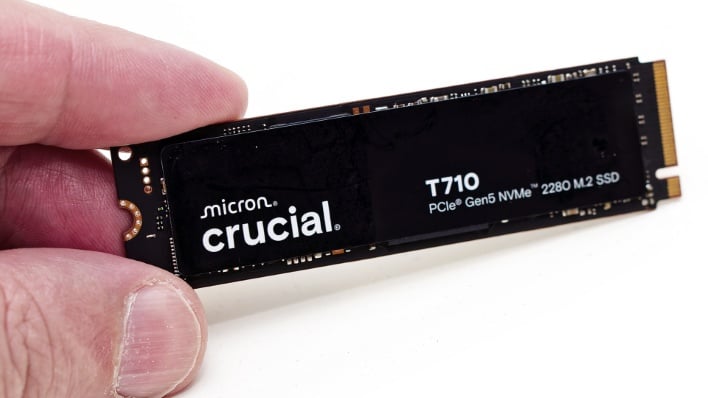
Crucial has unveiled its latest high-performance SSD, the T710, marking a significant leap in the company’s NVMe M.2 offerings. Starting at $179 for the 1TB version and $279 for the 2TB model, the T710 is Crucial’s fastest drive to date, designed to cater to desktops, laptops, and game consoles. This flexibility sets it apart from many other Gen 5 drives that are typically restricted to desktop use.
The Crucial T710 promises excellent performance, fast game level loads, and relatively low power consumption. However, it comes with a price premium and doesn’t always outpace its predecessor, the T705. Despite these caveats, the T710 is poised to be a game-changer in the SSD market.
Breaking Down the Technology
Micron, the parent company of Crucial, has been on a remarkable run with its SSDs. The T700 and T705 models were highly acclaimed, with the T705 being the fastest consumer SSD upon its release in February last year. The T710, however, shifts gears by utilizing Silicon Motion’s SM2508 controller instead of the Phison E26 used in previous models.
The SM2508 controller, combined with advanced NAND technology, not only enhances performance but also reduces power consumption. This makes the T710 a versatile option for various devices, including game consoles, where power efficiency is crucial.
Specifications and Features
The Crucial T710 SSD is available in 1TB, 2TB, and 4TB capacities, with or without a heatsink. The inclusion of a low-profile heatsink is particularly beneficial for PlayStation 5 users, ensuring consistent performance without throttling. The drives use the M.2 2280 form factor, featuring a dark-colored PCB with a populated top side and a bare bottom side, except for branding and technical details.
The heart of the T710 is its SM2508 controller, an 8-channel unit capable of 3,600 MT/s per channel, manufactured using TSMC’s 6nm process technology. It boasts a quad-core ARM Cortex R8 CPU complex and supports four PCIe lanes, achieving data transfer speeds of up to 32Gb/s. The controller is paired with Micron’s G9 NAND flash memory and includes a DRAM cache of 1GB per 1TB capacity.
Additional features include a PCIe Gen x4 (Gen 5) interface, TRIM and active garbage collection, NVMe 2.0 specification support, ECC, and AES256 encryption with TCG Opal 2.01+ support. The T710’s performance varies with capacity, with the 2TB model rated for up to 14,500/13,800MB per second reads and writes, respectively, and endurance rated at 1200TBW.
Performance Benchmarks
To assess the T710’s performance, various benchmarks were conducted using a high-end test system. The SSDs were installed as secondary volumes, with a separate drive for the OS and benchmark installations. The test system featured an Intel Core i9-14900K processor, MSI Z790 Godlike motherboard, and 32GB of Micron DDR5-6000 memory, running Windows 11 Pro.
IOMeter and ATTO Disk Benchmark
The IOMeter benchmark revealed that the T710 performs admirably with random 4K access patterns but lags slightly with 8K patterns that include sequential transfers. The ATTO Disk Benchmark showed the T710 excelling in sequential reads and writes, leading the pack in several transfer size categories.
The Crucial T710 achieved up to 14,500 MB/s read and 13,800 MB/s write speeds, with up to 2.2M read and 2.3M write IOPS.
Latency was competitive, with the T710 performing well against other high-end consumer SSDs. However, it showed some weaknesses in the SANDRA File System Benchmark, landing near the bottom of the tested drives.
Implications for the SSD Market
The release of the Crucial T710 represents a significant step forward in SSD technology, particularly for users seeking high performance and low power consumption. Its compatibility with a wide range of devices, including game consoles, makes it a versatile choice for consumers.
As the demand for faster and more efficient storage solutions grows, the T710 positions Crucial as a leader in the PCIe Gen 5 space. With its competitive pricing and robust feature set, the T710 is likely to appeal to both enthusiasts and everyday users.
Looking ahead, the success of the T710 could spur further innovation in the SSD market, prompting other manufacturers to explore similar advancements in controller technology and power efficiency. For now, the Crucial T710 stands as a testament to the rapid evolution of storage technology and its impact on computing performance.




